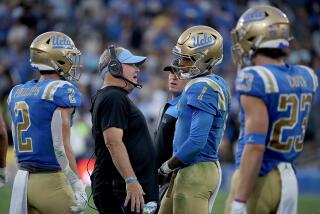Hughes, Perkin-Elmer to Pay U.S. for Hubble Telescope Flaw
- Share via
WASHINGTON — Hughes Aircraft and Perkin-Elmer Corp. agreed Monday to pay $25 million to head off a threatened government lawsuit charging them with liability for the defect that crippled the $2-billion Hubble space telescope, the Justice Department said Monday.
Under terms of the settlement, Perkin-Elmer, which owned the Danbury Optical System unit that produced the flawed mirror in the telescope, will pay $15 million. Los Angeles-based Hughes, which acquired the Danbury unit after the mirror was produced, will pay $10 million.
The agreement concludes a three-year investigation by the Justice Department and releases the two companies from any further liability claims. Hughes will pay its portion by forgoing fees it would otherwise have received from the National Aeronautics and Space Administration, while Perkin-Elmer will pay the $15 million.
The Justice Department asserted that the two companies knew or should have known about the defect. Hughes officials said Monday that they agreed to the settlement only as a goodwill gesture because NASA, the Hubble sponsor, is a valued customer.
The dispute raised widespread concerns in the aerospace industry that the government for the first time was attempting to make aerospace contractors liable for failed equipment, even when the problems resulted from honest errors.
The Aerospace Industries Assn., a trade group, intervened on Hughes’ behalf several weeks ago when it appeared that the Justice Department would bring suit under the False Claims Act.
When Perkin-Elmer’s Danbury unit produced the mirror in the early 1980s, a microscopic optical flaw was ground into the mirror’s surface. It was not discovered until NASA launched the Hubble in April, 1990, and the telescope was unable to focus properly.
Hughes agreed to buy the Danbury unit in 1989, and the contract for the Hubble was formally transferred to Hughes in May, 1990, a month after the launch. Hughes contended that NASA knew about the flaw at that time but had failed to disclose it when agreeing to transfer the contracts and liability to Hughes, the company said.
“No one at NASA or Perkin-Elmer ever told Hughes Danbury about a potential problem with the mirror when Hughes Danbury became involved in the Hubble project,” said Hughes Chairman C. Michael Armstrong. “If they had, Hughes would not have gone through with the purchase or taken over the Hubble contract without proper indemnification.”
The defect has severely impeded the usefulness of the Hubble telescope, although it has made a number of important astronomical breakthroughs.
Later this year, NASA plans a space shuttle mission to install a special optical lens that will upgrade the telescope to its intended capability. The cost of that mission is estimated at $86 million.
More to Read
Inside the business of entertainment
The Wide Shot brings you news, analysis and insights on everything from streaming wars to production — and what it all means for the future.
You may occasionally receive promotional content from the Los Angeles Times.










